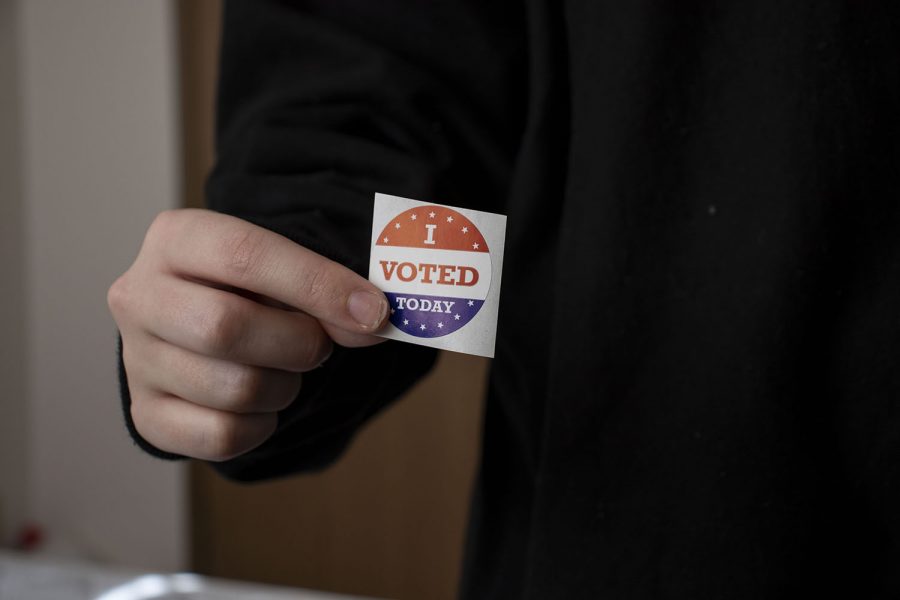Iowans convicted of felonies cast their vote in a tumultuous election
As the governor’s office looks to make an executive order to restore voting rights for felons more permanent, one Iowan speaks about his renewed claim to citizenship.
Photo Illustration by Hannah Kinson
December 1, 2020
Ahead of the January start to the legislative session in Iowa, a state which has long been a national leader of racial disparities in the state’s criminal-justice system, all eyes are on Iowa Gov. Kim Reynolds and lawmakers to enact a more permanent restoration of voting rights for those convicted of felonies.
Mere months before the November election, an executive order by Reynolds ended Iowa’s tenure as the only state in the country that didn’t restore the voting rights of people convicted of felonies. For one Iowan, exercising his freedom to vote during a tumultuous year, for the first time in more than a decade, made him truly feel like a restored citizen.
“I can take part in the rights and benefits of being a citizen, because I am a citizen,” said Kenneth Bailey, 39, who resides in Johnson County. “Whereas prior to that, it’s like even though I’m doing everything right, there’s still certain things I can’t enjoy.”

Bailey served seven years in prison and was released in 2014. This was the first election he was able to vote in since he voted for George W. Bush in 2004. He voted for Jo Jorgenson on Nov. 3, his first third-party vote.
Reynolds signed an executive order on Aug. 5 that restored the voting rights of people convicted of felonies after having a meeting in the summer with Black Lives Matter activists, which was followed up with two months of increased public pressure to sign the order. Former Gov. Tom Vilsack reinstated felon voting rights in 2005, but former Gov. Terry Branstad reversed that order in 2011.
While Reynolds’ order automatically qualified people with felony convictions to register to vote, they must have completed their parole. People with murder or manslaughter convictions are still not eligible to vote.
Bailey said he typically leans Republican, but he didn’t like Donald Trump or Joe Biden.
“When it comes down to it, your vote is your vote, and you should feel comfortable voting for the person you feel is best to run the country, as opposed to having to give up your own positions,” Bailey said.
Before Reynolds’ executive order, Iowa had a long and complicated process for someone convicted of a felony to have their voting rights restored. Bailey said he tried to get his voting rights restored in 2019 when he finished parole, but the application process was nearly impossible to navigate without legal help.
Bailey never completed that process, and said the daunting application deterred people from even trying to reinstate their rights. He said the process had the potential to be retraumatizing for someone also trying to reenter society.
According to a 2020 report from The Sentencing Project, as of Oct. 30, more than 45,000 Iowans convicted of felonies had their voting rights restored since 2016. About 11 percent of the people still disenfranchised in Iowa are Black and 3.8 percent are Latinx — both higher than the national averages.
RELATED: Reynolds signs executive order restoring felon voting rights
Reynolds spokesperson Pat Garrett wrote in an email to The Daily Iowan that the governor “will continue to advocate for a constitutional amendment regarding felon voting rights which would be a permanent solution to this issue.”
“In the meantime, her office will continue to work with local county auditors and the Iowa Secretary of State’s office to help any individual looking to navigate this process and vote this year,” Garrett wrote. “We also continue to get a lot of positive feedback from individuals who were able to vote this year because of the executive order.”
Black Lives Matter advocates, Reynolds, and other lawmakers met in June to work on restoring felon voting rights.
The Black Lives Matter movement sparked protests across the state in the beginning of the summer, which led to the meeting with the governor. Reynolds initially agreed to have a proposal for the order the following Monday, but didn’t draft the order until weeks later in August.
“For me personally this summer, the energy, the advocacy that we had for individuals to expand voting rights in Iowa, was amazing, and I was disappointed to see it happen later on this summer,” said state Rep. Ras Smith, D-Waterloo, a participant in the June meeting.
Lawmakers and advocates for restoring voting rights had less than three months to do outreach and education after Reynolds’ executive order to ensure people in the state knew their voting rights were restored. According to the Iowa Secretary of State’s office, about 35,000 Iowans became eligible to have their rights restored.
Smith said Reynolds’ Aug. 5 press conference was about all the marketing the state did in terms of notifying people of the order. Smith said he hopes to see more progress this upcoming legislative session on a constitutional amendment to make the Reynolds’ order harder to undo.
Inside Out Reentry Executive Director Michelle Heinz said the organization has long advocated for having felon voting rights restored, and tried to do outreach in Johnson County to let people know they could vote.
Inside Out Reentry Community is a Johnson County-based nonprofit organization that assists people after incarceration with case management, employment, and housing. Heinz said the organization tried to spread the word at their weekly meetings and through social media.
“I think the biggest challenge … is that the majority of people that are eligible are just kind of out in the community living their lives,” Heinz said. “They’re just working and raising families. They aren’t necessarily connected with the reentry organization anymore.”
She said a common frustration she’s heard from people who could not vote was that they were paying taxes but could not be civically engaged.
“Someone I spoke with was excited about being able to participate at the … city council and school board elections as well because that directly impacts their community that they live in,” she said.
















